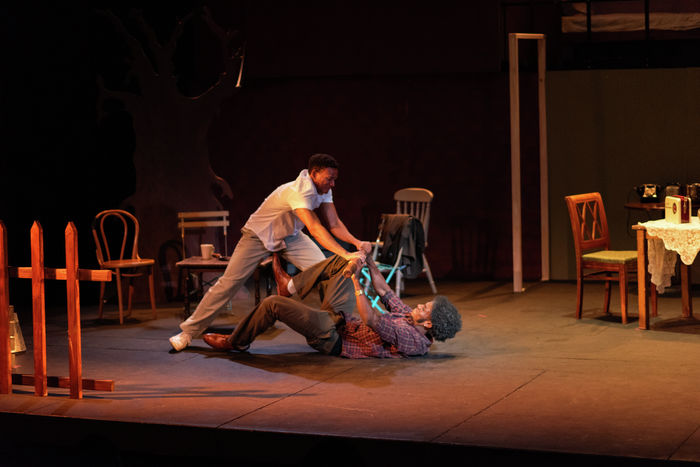Othello at Pembroke Chapel enthralls and frightens
Millie Wooler finds this cast more than matches the demands of the text – and its stage

From the moment Iago (Jaeyen Lian) and Roderigo (Toby Trusted) march onto the stage, The Tragedy of Othello proves gripping. The opening scene of any production is always important, but Shakespeare’s masterpiece requires an even greater level of introductory perfection than most, for here we are introduced to the play’s most memorable character in Iago – and one of its essential duos in Lian and Trusted.
The pair have an undeniable recurring chemistry. They drive the narrative, appearing regularly to demonstrate Iago’s growing influence over events. Their scenes also allow the audience to vent some of their frustration, with Roderigo teetering on the edge of discovering the extent of Iago’s scheming, only to have his agency continually thwarted through the latter’s sharply-delivered manipulation.
“Lian as Iago must have been an obvious casting choice”
Lian as Iago must have been an obvious casting choice. His eye contact with members of the audience is deeply unsettling and breaks the boundary between actor and audience, amplifying the power of the soliloquy format in such a way as to attract and repel us in equal measure. The precision of his performance is accompanied by the (limited) adaptations to the set. In dropping the lights during his soliloquies, the stage shrinks to heighten the intimacy between Iago and us – his unwitting co-conspirators.
Overall, despite some clumsiness in delivery (which we might ascribe to opening-night nerves), the lines are spoken naturalistically and confidently across the cast. This ease of speech dissolves potential linguistic barriers. That said, this production is not entirely entry-level, and a level of literacy with the text is probably required – a natural result of any performance limited by a small cast and crew. Despite their small size, though, this cast do more than enough to uphold the dramatic conviction expected of a tragedy like Othello. Act 2 Scene 3, for example, generally requires a large supporting ensemble to create the sense of rowdiness. Stripped back to just three essential characters, Lian, Jacob Coughlan (Montano) and Arya Kalavath (Cassio) never allow the sense of festivity at the scene’s outset to fail.
Kalavath’s performance across the play is commendable. Cassio is a demanding character in his emotional range – one moment reserved, the next animated by the jollity of his drunkenness, which is quickly followed by the depths of his despair when stripped of his role due to Iago’s scheming. Kalavath’s transitions between such emotions are impeccable and entirely believable. Meanwhile, Juliette Ball’s Bianca breaks the tension of the last few acts, providing the audience with brief moments of laughter in an otherwise harrowing ending. She fully immerses herself in the role and received a consensus of praise in return. None of this detracts from Lauren Akinluyi’s Othello and Lucy White’s Desdemona. Softly spoken, they stand distant from their harshly-spoken companions in the opening acts. The innocent Desdemona appears fragile, and pitiable, especially against the incremental cruelty of Othello.
A traverse stage is complicated and easy to fumble. I have seen it performed convincingly, and I have seen it ruin a production. Thankfully (despite slightly uncomfortable seats) this performance falls into the former category. The actors are able to optimise the space that they have available, drawing out an exit or declaring an entrance with flair. The only time it seems to fail is during Act 4 Scene 1, when Othello is perhaps too distanced from the main action, resulting in some ill-timed transitions between duologue and aside.
“This cast do more than enough to uphold the dramatic conviction expected of a tragedy like Othello"
Where the play perhaps struggles most is in its relocation to the 1920s. Larmour and Oberman’s The Merchant of Venice 1936 recently transposed Shakespeare’s Venice to an East End setting in the run-up to the ‘Battle of Cable Street’. There, the play was fully immersed into its new setting and the audience could immediately recognise why this era had been chosen. Here, the reasons for the transportation of the plot into the 1920s specifically is less clear, perhaps hindered by a disjointure between costume and setting. It does emphasise the timelessness of the plot, though - its resonance through generations.
The focus at the end becomes intimately feminine between White’s Desdemona and Daphne Stavride’s Emilia. White’s song - juxtaposing Iago’s in the second act – haunts the final scenes in its prophetic nature, and the audience in its poignant beauty. Thanks to Tally Arundell’s careful direction, Emilia’s tirade against her husband overwhelms the final scene. In a play obsessed with the power of speech, Stavride delivers her denouncement with power and pathos.
For Shakespeare lovers, The Tragedy of Othello is an engaging and enjoyable adaptation of a play that evokes empathy and disgust in equal measure. Adapting Shakespeare always evokes an emotive response, especially when removing his plays from their original context. Tally Arundell has directed an energetic production which is well-worth watching while it is on.
‘The Tragedy of Othello’ is showing at Pembroke College Chapel from Wednesday 30th October until Saturday 2nd November, at 6:30pm.
 News / Caius mourns its tree-mendous loss23 December 2025
News / Caius mourns its tree-mendous loss23 December 2025 Comment / Yes, I’m brown – but I have more important things to say22 December 2025
Comment / Yes, I’m brown – but I have more important things to say22 December 2025 News / Cambridge welcomes UK rejoining the Erasmus scheme20 December 2025
News / Cambridge welcomes UK rejoining the Erasmus scheme20 December 2025 News / CUP announces funding scheme for under-represented academics19 December 2025
News / CUP announces funding scheme for under-represented academics19 December 2025 News / King appoints Peterhouse chaplain to Westminster Abbey22 December 2025
News / King appoints Peterhouse chaplain to Westminster Abbey22 December 2025










